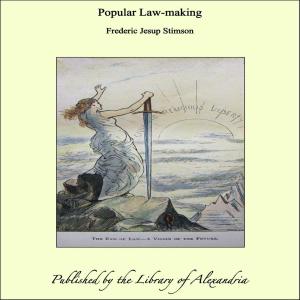| Author: | Margaret Oliphant Wilson Oliphant | ISBN: | 9781465616005 |
| Publisher: | Library of Alexandria | Publication: | March 8, 2015 |
| Imprint: | Language: | English |
| Author: | Margaret Oliphant Wilson Oliphant |
| ISBN: | 9781465616005 |
| Publisher: | Library of Alexandria |
| Publication: | March 8, 2015 |
| Imprint: | |
| Language: | English |
Mr and Mrs Robert Drummond lived in a pretty house in the Kensington district; a house, the very external aspect of which informed the passer-by who they were, or at least what the husband was. The house was embowered in its little garden; and in spring, with its lilacs and laburnums, looked like a great bouquet of bloom—as such houses often do. But built out from the house, and occupying a large slice of the garden at the side, was a long room, lighted with sky windows, and not by any means charming to look at outside, though the creepers, which had not long been planted, were beginning to climb upon the walls. It was connected with the house by a passage which acted as a conservatory, and was full of flowers; and everything had been done that could be done to render the new studio as beautiful in aspect as it was in meaning. But it was new, and had scarcely yet begun, as its proprietor said, to 'compose' with its surroundings. Robert Drummond, accordingly, was a painter, a painter producing, in the mean time, pictures of the class called genre; but intending to be historical, and to take to the highest school of art as soon as life and fame would permit. He was a very good painter; his subjects were truly 'felt' and exquisitely manipulated; but there was no energy of emotion, no originality of genius about them. A great many people admired them very much; other painters lingered over them lovingly, with that true professional admiration of 'good work' which counteracts the jealousy of trade in every honest mind. They were very saleable articles, indeed, and had procured a considerable amount of prosperity for the young painter. It was almost certain that he would be made an Associate at the next vacancy, and an Academician in time. But with all this, he was well aware that he was no genius, and so was his wife. The knowledge of this fact acted upon them in very different ways; but that its effect may be fully understood, the difference in their characters and training requires to be known. Robert Drummond had never been anything but a painter; attempts had been made in his youth to fix him to business, his father having been the senior clerk, much respected and utterly respectable, of a great City house; and the attempt might have been successful but that accident had thrown him among artists, a kind of society very captivating to a young man, especially when he has a certain command of a pencil. He threw himself into art, accordingly, with all his soul. He was the sort of man who would have thrown himself into anything with all his soul; not for success or reward, but out of an infinite satisfaction in doing good work, and seeing beautiful things grow under his hand. He was of a very sanguine mind, a mind which seldom accepted defeat, but which, with instinctive unconscious wisdom, hesitated to dare the highest flights, and to put itself in conflict with those final powers which either vanquish a man or assure his triumph.
Mr and Mrs Robert Drummond lived in a pretty house in the Kensington district; a house, the very external aspect of which informed the passer-by who they were, or at least what the husband was. The house was embowered in its little garden; and in spring, with its lilacs and laburnums, looked like a great bouquet of bloom—as such houses often do. But built out from the house, and occupying a large slice of the garden at the side, was a long room, lighted with sky windows, and not by any means charming to look at outside, though the creepers, which had not long been planted, were beginning to climb upon the walls. It was connected with the house by a passage which acted as a conservatory, and was full of flowers; and everything had been done that could be done to render the new studio as beautiful in aspect as it was in meaning. But it was new, and had scarcely yet begun, as its proprietor said, to 'compose' with its surroundings. Robert Drummond, accordingly, was a painter, a painter producing, in the mean time, pictures of the class called genre; but intending to be historical, and to take to the highest school of art as soon as life and fame would permit. He was a very good painter; his subjects were truly 'felt' and exquisitely manipulated; but there was no energy of emotion, no originality of genius about them. A great many people admired them very much; other painters lingered over them lovingly, with that true professional admiration of 'good work' which counteracts the jealousy of trade in every honest mind. They were very saleable articles, indeed, and had procured a considerable amount of prosperity for the young painter. It was almost certain that he would be made an Associate at the next vacancy, and an Academician in time. But with all this, he was well aware that he was no genius, and so was his wife. The knowledge of this fact acted upon them in very different ways; but that its effect may be fully understood, the difference in their characters and training requires to be known. Robert Drummond had never been anything but a painter; attempts had been made in his youth to fix him to business, his father having been the senior clerk, much respected and utterly respectable, of a great City house; and the attempt might have been successful but that accident had thrown him among artists, a kind of society very captivating to a young man, especially when he has a certain command of a pencil. He threw himself into art, accordingly, with all his soul. He was the sort of man who would have thrown himself into anything with all his soul; not for success or reward, but out of an infinite satisfaction in doing good work, and seeing beautiful things grow under his hand. He was of a very sanguine mind, a mind which seldom accepted defeat, but which, with instinctive unconscious wisdom, hesitated to dare the highest flights, and to put itself in conflict with those final powers which either vanquish a man or assure his triumph.















